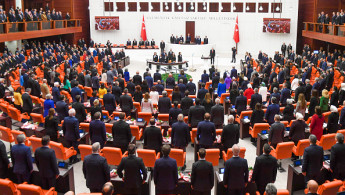Turkey opens delayed debate on Sweden's NATO bid
Turkey's parliament opened a long-delayed debate Thursday on Sweden's NATO aspirations that could strengthen Ankara's ties with Western allies despite its fury over Israel's war on Gaza.
The first day of discussions in parliament's foreign affairs committee represented an important moment for European security and Turkey's relations with the West.
The talks ended without an agreement and are expected to resume next week.
Neighbours Sweden and Finland dropped decades of military non-alignment and sought the nuclear protection afforded by the US-led defence organisation in response to Russia's invasion of Ukraine last year.
Their bids won fast-track approval from all NATO members except Turkey and Hungary.
The two ultimately relented and accepted Finland into the bloc this year.
The step roughly doubled the length of NATO's border with Russia and bolstered the security of three tiny Baltic nations that joined the bloc after the Soviet Union's collapse.
But Turkey took exception to Sweden - a liberal Nordic nation that opened its doors to migrants in past decades - for its refusal to crack down on Kurdish support groups that Ankara views as "terrorists".
Hungary has been following Turkey's lead in the 18-month saga.
Western allies worry that Hungarian Prime Minister Viktor Orban is using his close ties with Russian President Vladimir Putin to undermine NATO and sow divisions in Europe.
Turkish President Recep Tayyip Erdogan formally signed off on Sweden's application at a raucous NATO summit in July.
But NATO hopes that Turkey would finally ratify the bid when parliament returned from summer recess receded as war returned to the Middle East.
Erdogan continues to voice occasional displeasure at Sweden for its refusal to ban marches by Kurdish groups in Stockholm.
But Sweden has tightened its anti-terrorism legislation in response to Turkish pressure.
A Swedish court last month also convicted a man of inciting ethnic hatred with a 2020 burning of the Islamic holy book.
"Sweden has taken positive steps regarding its commitments," Deputy Foreign Minister Burak Akcapar told the foreign affairs committee Thursday.
But he added that "Israel's attacks have cost the lives of thousands of people" and "a more comprehensive approach to security" was required from the West.
Erdogan has been launching relentless attacks at both Israel and the West for the scale of the civilian toll of the Gaza war.
He has called Israel a "terror state" that was being used as a "pawn" to project the interests of the United States in the Middle East.
He has also warned that a broader "cross and crescent" war was breaking out between Israel's mostly Christian Western allies and the Muslim world.
And he has defended Hamas - proscribed as a terrorist organisation by the United States and European Union - as the legally elected rulers of Gaza who were fighting for their land.
His impassioned speeches are replayed throughout the day on Turkish television and feed bubbling anger at Israel across the mostly Muslim but officially secular nation.
Analysis: After a decade of tense ties, relations between Ankara and Tel Aviv had been slowly renormalising, but Israel's war on Gaza could see the process unravel once again
— The New Arab (@The_NewArab) November 14, 2023
Will Turkey-Israel ties reach breaking point amid Gaza war?
✍️ @GiorgioCafierohttps://t.co/FC7kgPGaVc
Yet Turkey has developed a reputation for pragmatism in its foreign relations during Erdogan's two-decade rule.
Eurasia Group analyst Emre Peker predicted that "Erdogan's outbursts will not derail (Turkey's) foreign policy balancing act".
Turkey is keen to win approval from the US Congress for a major F-16 fighter jet package that Washington has made conditional on Sweden's NATO bid.
Erdogan's decision to submit Sweden's application for parliamentary approval "was intended to showcase Turkey's key role in - and commitment to - the alliance," Peker wrote in a report.
Erdogan controls parliament through an alliance with a far-right group.
Opposition parties almost unanimously backed Finland's application and the full chamber is expected to give Sweden the green light once the bid passes the committee stage.





 Follow the Middle East's top stories in English at The New Arab on Google News
Follow the Middle East's top stories in English at The New Arab on Google News


